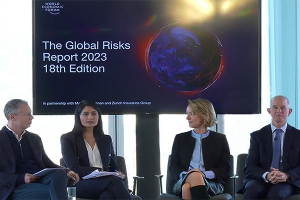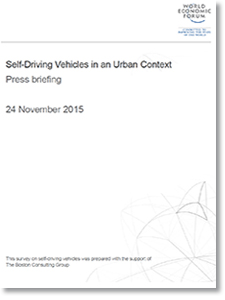Self-Driving Vehicles in an Urban Context
The World Economic Forum, in conjunction with the Boston Consulting Group, has released the results of its first global survey of consumers’ attitudes towards self-driving cars.
Our focus groups, and subsequent survey of 5,500 global city dwellers, reveals several surprising conclusions.
The first surprise is that consumers are vastly better informed about the topic than conventional wisdom suggests.
Several executives at car companies I talked to said that “consumers don’t even understand what self-driving means”.
Our research suggests otherwise. In our focus groups, average consumers given minimal, neutral prompting, were able to articulate use cases and implied benefits, both social and individual, with ease. They included doing business while on the road, or spending quality time with their children.
It’s obviously difficult to engage consumers in a conversation about a product they have never experienced, but the data in this research suggest that consumers are more amenable to the self-driving vehicle age than we might otherwise think. 58% of global respondents say they would take a ride in a fully self-driving vehicle. Acceptance is highest in emerging markets, such as China, India and the United Arab Emirates, about 50% in the US and the UK; and lowest in Japan and Germany.
Couple this enthusiasm with rapid technology advances, and it’s easy to come to the conclusion the road is open for self-driving cars. For example, Tesla’s launch in October of partial autonomy in cars across the world has gone off without any major hitches so far.
But our research suggests that the road ahead might not be so smooth, particularly regarding the use of driverless cars in urban areas. Autonomous cars may not dramatically change the business of buying and owning cars in rural areas, but, thanks to influences like the sharing economy, it could fundamentally reshape urban transportation in cities as diverse as Miami, Dubai and Helsinki.
Uber and other mobility-on-demand players have experienced impressive growth and made headline news. Imagine how much more dramatic the impact will be when the driver, who represents approximately half the cost per kilometer, is taken out of the equation. Whether a fleet of shared, self-driving taxis is run by Uber, Google, General Motors or someone else, the low cost could be compelling enough to make private car ownership redundant for many city inhabitants.
Concurrent to our consumer survey, the World Economic Forum undertook qualitative and quantitative research with city transit authorities and policy makers in 12 cities, including Pittsburgh, Amsterdam and New York. Although not a statistically representative survey, several general conclusions jump out from this research.
What’s Related




Favorites





